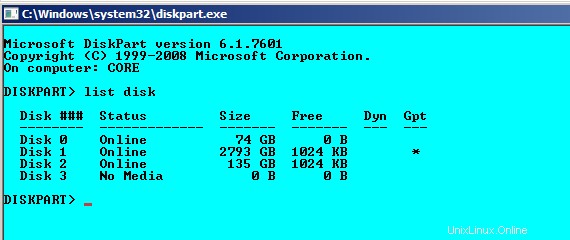Il y a diskpart
[démarrer] [exécuter] diskpart list disk

De plus, il y a wmic diskdrive . Vous pouvez l'utiliser à partir de la ligne de commande, mais vous souhaiterez probablement appliquer des filtres pour éviter de vous retrouver avec trop d'informations.
Availability BytesPerSector Capabilities CapabilityDescriptions Caption CompressionMethod ConfigManagerErrorCode ConfigManagerUserConfig CreationClassName DefaultBlockSize Description DeviceID ErrorCleared ErrorDescription ErrorMethodology FirmwareRevision Index InstallDate InterfaceType LastErrorCode Manufacturer MaxBlockSize MaxMediaSize MediaLoaded MediaType MinBlockSize Model Name NeedsCleaning NumberOfMediaSupported Partitions PNPDeviceID PowerManagementCapabilities PowerManagementSupported SCSIBus SCSILogicalUnit SCSIPort SCSITargetId SectorsPerTrack SerialNumber Signature Size Status StatusInfo SystemCreationClassName SystemName TotalCylinders TotalHeads TotalSectors TotalTracks TracksPerCylinder
512 {3, 4} {"Random Access", "Supports Writing"} LSI 9750-8i DISK SCSI Disk Device 0 FALSE Win32_DiskDrive Disk drive \\.\PHYSICALDRIVE0 5.08 0 SCSI (Standard disk drives) TRUE Fixed hard disk media LSI 9750-8i DISK SCSI Disk Device \\.\PHYSICALDRIVE0 2 SCSI\DISK&VEN_LSI&PROD_9750-8I____DISK\5&15EE98A3&0&000000 0 0 10 0 19 L2080BGN154FA1000272 -576210269 79987195904 OK Win32_ComputerSystem CORE 36707 224 156224992 8222368 224
512 {3, 4} {"Random Access", "Supports Writing"} LSI 9750-8i DISK SCSI Disk Device 0 FALSE Win32_DiskDrive Disk drive \\.\PHYSICALDRIVE1 5.08 1 SCSI (Standard disk drives) TRUE Fixed hard disk media LSI 9750-8i DISK SCSI Disk Device \\.\PHYSICALDRIVE1 2 SCSI\DISK&VEN_LSI&PROD_9750-8I____DISK\5&15EE98A3&0&000100 0 0 10 1 63 WQC05071864F9000A2CB 2999965248000 OK Win32_ComputerSystem CORE 364725 255 5859307125 93004875 255
512 {3, 4} {"Random Access", "Supports Writing"} LSI 9750-8i DISK SCSI Disk Device 0 FALSE Win32_DiskDrive Disk drive \\.\PHYSICALDRIVE2 5.08 2 SCSI (Standard disk drives) TRUE Fixed hard disk media LSI 9750-8i DISK SCSI Disk Device \\.\PHYSICALDRIVE2 1 SCSI\DISK&VEN_LSI&PROD_9750-8I____DISK\5&15EE98A3&0&000200 0 0 10 2 63 P6901YFP93CC9C000C66 -900772765 144987010560 OK Win32_ComputerSystem CORE 17627 255 283177755 4494885 255
Generic Flash HS-COMBO USB Device 0 FALSE Win32_DiskDrive Disk drive \\.\PHYSICALDRIVE3 4.44 3 USB (Standard disk drives) TRUE Generic Flash HS-COMBO USB Device \\.\PHYSICALDRIVE3 0 USBSTOR\DISK&VEN_GENERIC&PROD_FLASH_HS-COMBO&REV_4.44\070809103045&1 0 OK Win32_ComputerSystem CORE
OK, il n'y a aucun doute que diskpart est un bon outil pour les partitions Windows, mais il semble qu'il ne puisse lire ou modifier que le disque local Windows et ses partitions, il ne peut pas reconnaître le fichier disque comme MBR , recovery , ou EBR1 fichier de partition que vous voyez dans le système de fichiers Linux ; il existe donc vraiment un outil qui correspond à fdisk beaucoup dans le système Windows, c'est un outil cmd, voici son nom et son site de téléchargement :
Téléchargement de fdisk GPT
et voici sa photo de reconnaître mon MBR fichier :
Capture d'écran du fdisk GPT
Il a une syntaxe similaire avec fdisk -l filename , vous pouvez utiliser gdisk64.exe -l filename .
La page de téléchargement inclut également son site Web officiel, vous pouvez en obtenir plus d'utilisation ! Ou utilisez simplement le gdisk64.exe /? dans cmd pour plus _